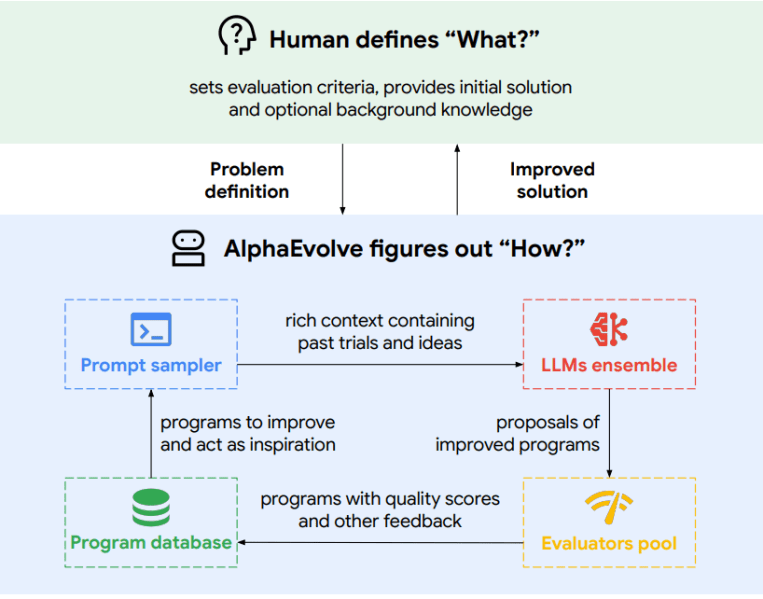Google’s AlphaEvolve AI: A New Era in Autonomous Coding
Google’s DeepMind has unveiled AlphaEvolve, an AI system that autonomously rewrites critical code, achieving remarkable results within Google’s infrastructure. This development not only showcases cutting-edge AI technology but also provides valuable insights for enterprise tech leaders looking to implement similar autonomous agents.
Key Achievements of AlphaEvolve
- Reclaimed 0.7% of Google’s global data center capacity
- Shattered a 56-year-old record in matrix multiplication, crucial for machine learning workloads
- Demonstrated significant cost savings, potentially in the hundreds of millions annually
Architecture and Components
AlphaEvolve operates on an ‘agent operating system’ – a distributed, asynchronous pipeline designed for continuous improvement at scale. Its core components include:
- A controller
- A pair of large language models (Gemini Flash for breadth; Gemini Pro for depth)
- A versioned program-memory database
- A fleet of evaluator workers

Lessons for Enterprises
-
Robust Infrastructure is Crucial: To deploy autonomous agents at scale, enterprises need comparable orchestration, testing, and guardrails. This includes job queues, versioned memory stores, service-mesh tracing, and secure sandboxing for generated code.
-
Automated Evaluation is Key: Production agents require deterministic scorekeepers, such as unit tests or simulators, to provide objective feedback. This evaluation framework is both a safety net and a growth engine for agentic AI.
-
Strategic Model Usage: Enterprises can benefit from using faster, cheaper models for initial brainstorming and more capable models for refining the best ideas. Preserving every trial in a searchable history accelerates later work and can be reused across teams.
-
Focus on Quantifiable Metrics: When implementing agentic AI, target workflows where ‘better’ can be quantified through metrics like latency, cost, or error rate. This focus enables automated search and reduces deployment risks.
-
Essential Prerequisites: Before investing in complex agentic systems, ensure you have:
- Machine-gradable problems
- Clear, automatable metrics
- Sufficient compute capacity
- Codebase and memory readiness
The Future of Agentic AI in Enterprises
The success of AlphaEvolve highlights three critical pillars for enterprise agentic AI:
- Deterministic evaluators for unambiguous scoring
- Long-running orchestration to manage different model capabilities
- Persistent memory to build on previous iterations
Enterprises with existing logging, testing harnesses, and versioned code repositories are well-positioned to adopt agentic AI. The next step is integrating these assets into a self-serve evaluation loop to compete and validate multiple agent-generated solutions.
As Cisco’s Anurag Dhingra noted, ‘It’s happening, it is very, very real.’ Enterprises using AI agents in various sectors are already experiencing significant impacts. To stay competitive, it’s crucial to start proving out contained, metric-driven use cases and scaling what works.


